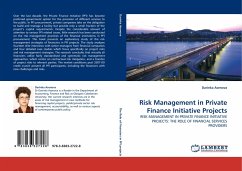Over the last decade, the Private Finance Initiative (PFI) has become preferred government option for the provision of different services to the public. In PFI procurement, private companies take on the obligation to build and manage a facility but provide only a small fraction of the project s capital requirements. Despite the considerable amount of attention to various PFI related issues, little research has been conducted on the risk management practices of the financial institutions in PFI procurement. This book presents an exploratory study of the risk management strategies of financiers in PFI projects. The study analyses fourteen elite interviews with senior managers from financial companies and four detailed case studies which focus specifically on project risks and risk management strategies. The research concludes that virtually all financiers utilise fairly standardised and systematic risk management approaches, which centre on contractual risk mitigation, and a transfer of project risks to relevant parties. The market conditions post 2007-09 credit crunch present all PFI participants, including the financiers with new challenges and risks.
Bitte wählen Sie Ihr Anliegen aus.
Rechnungen
Retourenschein anfordern
Bestellstatus
Storno








